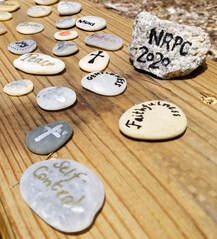One sentence on page 2 of Thompson’s chapter 9 stopped me in my tracks.
The entire time I’ve been doing this blog project based on Thompson’s Soul Feast, I’ve been amazed at the ways the particular practices have intersected with the peculiarities of life in the time of coronavirus. Sabbath, Worship and Fasting have been especially poignant in this time when usual routines are so thoroughly upended.
So, I’ve been wondering what this Hospitality chapter would say and how it might speak to this time when hospitality – at least hospitality as we commonly understand it – is verboten.
>Pause to consider: Regarding “hospitality as we commonly understand it,” Thompson invites us to consider these questions: What are your most vivid memories of receiving hospitality? Of offering it?
The sentence that stopped me in my tracks occurs in Thompson’s section on “Hospitality in Jewish and Christian Tradition.” In particular, she writes that “hospitality to strangers was a matter of mutual survival. It was a kind of social covenant, an implied commitment to transcend human differences in order to meet common human needs.” (p. 132)
This is exactly the understanding of hospitality that I’ve been considering as I wondered to myself about hospitality in the time of coronavirus.
For the first sixty days or so of this massive interruption of life as we knew it, hospitality seemed to blossom. Seems counterintuitive, doesn’t it? We shut down human-to-human contact, closed down schools/businesses/restaurants/churches/offices and locked down our homes. At the same time, though, we opened ourselves to what was happening next door.
Our neighborhood children wrote chalk notes to folks on our street and delivered painted stones to many a stoop. When we’d see Fritz on the way to the mailbox, we’d ask whether he and Helen – the senior-most couple on our street – needed anything from the grocery store. And several families nearby are gathering regularly for lawn chair visits (at a distance, of course). I even think I experienced an uptick in waves and smiles between drivers and pedestrians and between grocery shoppers and check-stand clerks. I suppose isolation at home brought out our friendliness and concern on those precious few occasions when we ventured out.
>Pause to consider: What new sorts of hospitality have you observed during stay-at-home orders? What forms of hospitality have you been missing?
The entire time I’ve been doing this blog project based on Thompson’s Soul Feast, I’ve been amazed at the ways the particular practices have intersected with the peculiarities of life in the time of coronavirus. Sabbath, Worship and Fasting have been especially poignant in this time when usual routines are so thoroughly upended.
So, I’ve been wondering what this Hospitality chapter would say and how it might speak to this time when hospitality – at least hospitality as we commonly understand it – is verboten.
>Pause to consider: Regarding “hospitality as we commonly understand it,” Thompson invites us to consider these questions: What are your most vivid memories of receiving hospitality? Of offering it?
The sentence that stopped me in my tracks occurs in Thompson’s section on “Hospitality in Jewish and Christian Tradition.” In particular, she writes that “hospitality to strangers was a matter of mutual survival. It was a kind of social covenant, an implied commitment to transcend human differences in order to meet common human needs.” (p. 132)
This is exactly the understanding of hospitality that I’ve been considering as I wondered to myself about hospitality in the time of coronavirus.
For the first sixty days or so of this massive interruption of life as we knew it, hospitality seemed to blossom. Seems counterintuitive, doesn’t it? We shut down human-to-human contact, closed down schools/businesses/restaurants/churches/offices and locked down our homes. At the same time, though, we opened ourselves to what was happening next door.
Our neighborhood children wrote chalk notes to folks on our street and delivered painted stones to many a stoop. When we’d see Fritz on the way to the mailbox, we’d ask whether he and Helen – the senior-most couple on our street – needed anything from the grocery store. And several families nearby are gathering regularly for lawn chair visits (at a distance, of course). I even think I experienced an uptick in waves and smiles between drivers and pedestrians and between grocery shoppers and check-stand clerks. I suppose isolation at home brought out our friendliness and concern on those precious few occasions when we ventured out.
>Pause to consider: What new sorts of hospitality have you observed during stay-at-home orders? What forms of hospitality have you been missing?
Then, I guess, we got tired of the pattern of super-hospitality. Or more frustrated about the isolation. Or less convinced that covid-19 is a concern. Or cynical that the common good was too detrimental to our personal freedoms.
I read a fascinating newspaper article that wonders whether face masks might be “the new face of restaurant hospitality.” As restaurants begin to re-open some diners find that the masks (and other PPE) are a welcome sign of the restaurant’s concern for their guests. Other restaurateurs and diners believe the dining experience should be a bit of an escape from an anxious world, so protective items are optional or absent in some places. And so the divide begins. I suppose one person’s hospitality can be another’s hostility, huh?
>Pause and consider: So, what is hospitality, really?
I expect that, when I asked you to consider your most vivid recollections of hospitality, some visions of extravagant events crossed your mind (over-the-top parties and the like). But I bet your mind kept casting about until you landed on the most profound welcome you’ve ever experienced.
Thompson describes a late night arrival, sans reservation but with bucketing rain, at a Scottish B-and-B. At first the owners look at Thompson and company and shake their heads. Then they look at each other, step away from the front door for a brief conversation and return to say, “Come on in!” It was a warm (and dry) welcome at just the right time. But it gets better. Next morning, after a full Scottish breakfast, the guests realized that the owners had relinquished their own bed so their late night visitors could have a pillow for the night. Wow!
Hospitality – real hospitality – meets you at your most needful and gladly sacrifices self for your benefit. Hospitality – real hospitality – is an enactment of grace, which is why we that those who practice the warmest and widest hospitality are gracious hosts.
>Pause and consider: How are the life/ministry/death/resurrection of Jesus God’s supreme enactment of grace, meeting us at our most needful with a sacrifice of self for our benefit?
I read a fascinating newspaper article that wonders whether face masks might be “the new face of restaurant hospitality.” As restaurants begin to re-open some diners find that the masks (and other PPE) are a welcome sign of the restaurant’s concern for their guests. Other restaurateurs and diners believe the dining experience should be a bit of an escape from an anxious world, so protective items are optional or absent in some places. And so the divide begins. I suppose one person’s hospitality can be another’s hostility, huh?
>Pause and consider: So, what is hospitality, really?
I expect that, when I asked you to consider your most vivid recollections of hospitality, some visions of extravagant events crossed your mind (over-the-top parties and the like). But I bet your mind kept casting about until you landed on the most profound welcome you’ve ever experienced.
Thompson describes a late night arrival, sans reservation but with bucketing rain, at a Scottish B-and-B. At first the owners look at Thompson and company and shake their heads. Then they look at each other, step away from the front door for a brief conversation and return to say, “Come on in!” It was a warm (and dry) welcome at just the right time. But it gets better. Next morning, after a full Scottish breakfast, the guests realized that the owners had relinquished their own bed so their late night visitors could have a pillow for the night. Wow!
Hospitality – real hospitality – meets you at your most needful and gladly sacrifices self for your benefit. Hospitality – real hospitality – is an enactment of grace, which is why we that those who practice the warmest and widest hospitality are gracious hosts.
>Pause and consider: How are the life/ministry/death/resurrection of Jesus God’s supreme enactment of grace, meeting us at our most needful with a sacrifice of self for our benefit?
From that couple on their front stoop in Scotland, to God incarnate faced with a rebellious humanity, hospitality means finding a way to “Yes” for the benefit of someone else.
As covid-19 continues to shape our lives, I wonder how we might be more gracious – a.k.a., hospitable – with one another? I asked a friend to answer that question and here’s what I heard: “We need to do more than offer fake politeness or the kind of hospitality you get at a fancy party. Hospitality in the time of covid is about being considerate of others’ needs, positions, feelings.”
In the mask or no mask debate (and the myriad of related binary questions) I expect hospitality means dropping the eye rolls, the heavy sighs and outright criticism, and finding a way to cross the divide with something that sounds like “Yes.” As Thompson stated it, this kind of hospitality to our strange neighbors is an act of “mutual survival, …a kind of social covenant, an implied commitment to transcend human differences in order to meet common human needs.” May God grant us the grace to be gracious hosts each to the other.
As covid-19 continues to shape our lives, I wonder how we might be more gracious – a.k.a., hospitable – with one another? I asked a friend to answer that question and here’s what I heard: “We need to do more than offer fake politeness or the kind of hospitality you get at a fancy party. Hospitality in the time of covid is about being considerate of others’ needs, positions, feelings.”
In the mask or no mask debate (and the myriad of related binary questions) I expect hospitality means dropping the eye rolls, the heavy sighs and outright criticism, and finding a way to cross the divide with something that sounds like “Yes.” As Thompson stated it, this kind of hospitality to our strange neighbors is an act of “mutual survival, …a kind of social covenant, an implied commitment to transcend human differences in order to meet common human needs.” May God grant us the grace to be gracious hosts each to the other.
 Stop by the outdoor worship space and take what you need to help you in your practice of hospitality.
Stop by the outdoor worship space and take what you need to help you in your practice of hospitality. Until next time,
Peace!
Lisa
Thompson, Marjorie, Soul Feast: An Invitation to the Christian Spiritual Life (New Rev edition). Westminster John Knox Press, 2014.
Peace!
Lisa
Thompson, Marjorie, Soul Feast: An Invitation to the Christian Spiritual Life (New Rev edition). Westminster John Knox Press, 2014.


 RSS Feed
RSS Feed